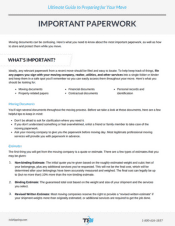If you’ve never worked with a moving company before, you may not know what’s involved or have all the details handy that you might need. Some of the documents can also be a bit confusing. Not only that, during your move you’re transporting sensitive personal information and documents. It’s a lot to keep track of! In this section of the Ultimate Guide to Preparing for Your Move, we’ll take a look at the most important moving documents, as well as how to store and protect them and your personal papers while you relocate to a new residence.
| STAY ORGANIZED: A moving timeline and checklist can help keep you organized throughout your move, from collecting the necessary paperwork to packing your home, to getting organized when you move in. |
What Paperwork is Important?
Ideally, any relevant paperwork from a recent move should be filed and easy to locate. But if you haven’t moved in a while, you may have a lot of documents piled up and they may not necessarily be organized. We get it! These things tend to fall by the wayside when important events or even day-to-day occurrences come up. To help keep track of things, file any papers you sign with your moving company, realtor, utilities, and other services into a single folder or binder you can keep handy on the day of the move.
If things have gotten a bit disorganized, don’t worry. Start by sorting through your stack and weeding out what’s important. Here’s what you should be looking for:
- Moving documents, including estimates, inventories and your bill of lading
- Property-related papers
- Financial documents
- Contractual documents
- Personal records and identification
Once you find them, these hard copies should be filed and kept in a safe spot you’ll remember so you can easily access them throughout your move.
|
Jump to: |
Moving Documents
You’ll sign several documents throughout the moving process that you will need to hang on to. If you’ve never hired a professional moving company before, you may not be familiar with them, but you’ll need to know what they are and what they should include in order to avoid falling victim to a moving scam. Before we take a look at these documents, here are a few helpful tips to keep in mind:
With those tips in mind, here’s what your moving documents should include:
Estimates
The first thing you will get from the moving company is a quote or estimate. Trustworthy, reputable moving companies will either send a representative to your home or have a detailed phone conversation to inventory your items. Either of these options allow them to provide an accurate estimate and details about services that might be necessary for difficult-to-move items. If you’re shipping some of your belongings separately, an in-person quote is less common.
There are a few types of estimates that you may be given:
- Binding Estimate - the guaranteed total cost based on the weight and size of your belongings and selected services.
- Revised Written Estimate - In the event that your shipment weighs more than originally estimated or additional services are required to get the job done, most moving companies reserve the right to provide you with a ‘revised written estimate’ or ‘revision written estimate’.

Inventories
It’s always a good idea to keep an inventory of your items for insurance purposes, but it becomes especially important when you’re moving. Having an inventory on hand can help you keep track of items, but more importantly it’s necessary when you’re using a moving company. If the moving company is packing your items for you, they will provide you with an inventory of all the items they boxed, but it’s always good practice to make an inventory of your own so you can keep a more detailed record, and it’s also handy to have in case of a fire or robbery.
There are two inventory lists that you will need:
- A household inventory of items that will be transported by the moving company.
- An inventory of items of high value so that movers can ensure steps are taken to protect them.
To make your personal inventory sheet as useful as possible when you move, include the following:
- Which box an item is placed in
- A description of the item
- What condition it’s in
- The serial number
- The amount you paid for it
- If possible, include a photograph of the item, especially if it’s valuable.
These details not only help you get a more accurate estimate and keep track of your items, but in the event that they are misplaced, damaged, or stolen, you can share the description and image with your insurance company and movers so they know exactly what is missing or what the damage is.This makes it easier for them to act quickly to replace, repair, or locate the item.
| MONEY SAVING TIP: Creating an inventory of all your belongings is the perfect time to declutter. The less stuff you have to move, the cheaper your move will be. Get our tips for decluttering before you move. |
Whether you pack yourself or have your moving company pack for you, check your items against your inventory and document any damage once you’ve arrived.
| PRO TIP: Having timestamped before and after photos is especially useful here because under the Carmack Amendment, you will not be compensated for damage if you can’t prove the carrier was negligent. |
Bill of Lading
The Bill of Lading is the official receipt, contract, and record of your moving agreement with the company. It will include detailed information about the services, fees, dates, and other important aspects of your agreement, such as insurance coverage. Either on or before moving day, both you and the moving company will be required to sign it in order to proceed with the move. Read it carefully to ensure that the information, details, and terms are correct and what you’ve previously agreed to.
Information that should be included in the Bill of Lading:
- The valuation addendum outlines what your shipment is worth as determined by the moving company, and is usually based on weight. This is what they will pay you in the event that they are responsible for damage to your belongings, and it is required when moving between states. There are two types that must be offered: Basic value protection, and full value protection. Ask your moving company for a complete explanation of their full value protection before you move - it’s your responsibility to study this provision carefully and to make the necessary declarations of value.
- The details and cost of any insurance purchased from an insurance company on your behalf by the moving company to complement the valuation.
- An inventory of your belongings.
Company Tariff, Rules & Regulations
When receiving your estimate you should request a copy of the company’s tariff, rules and regulations. This document will include information about additional services or materials and their costs, which can help you prepare yourself for any financial surprises and allow you to prep your stuff in a way that will limit the amount of necessary services.
Property-related papers

Property-related papers include anything pertaining to the purchase, rental, lease or sale of your current, former, or new residence. Keep them with your moving documents and ensure that they have the name and contact information of your real-estate agent, landlord, or rental company.
Contractual documents
Warranties, receipts, guarantees and other documents related to large or expensive purchases, such as a car or household appliance, that you will need to get them serviced, repaired, or replaced by the manufacturer.
Personal Identification, Records, and Financial Documents
Financial documents and personal identification or records are especially important because of the sensitive information they contain, which can be used to steal your identity. Because of this, these items require extra care during the chaos that can result from a big move. Make sure you take extra steps to ensure these papers are secure:
Storage Tips
The most important thing to remember is to pack these documents in a safe and accessible location in case you need anything while you move. It’s also advisable that you keep these boxes with you in your personal vehicle, in the event that something goes wrong. There is a lot of important information in there that you don’t want lost.
You might be wondering what is the best way to organize and store these valuable documents. Try these tips:
- Label the box so it’s not mistakenly donated or packed away.
- Keep the documents in a safe location that’s easy to access and travel with them in your personal vehicle when it’s time to move.
- Make copies of the most important documents and keep them in a safe but separate location, such as the home of a trusted parent or relative.
Download our Printable GuideClick to download (PDF)
Download the complete printable Ultimate Guide to Preparing for Your Move. |
Keep Reading the Ultimate Guide to Preparing for Your MovePart 1: Budgeting for Your Move Part 7: Moving Large, Heavy, or Bulky Items |

